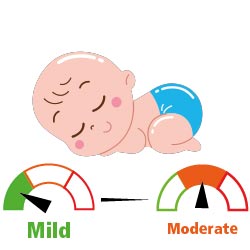- Cefixime 100mg/5ml suspension (W x 0.4)x1x7-10
- Revanin 125mg/5ml Syrup (w/2) Every 4 – 6 hours until fever subside
In excessive nasal secretions (Rinorrhea,sneezing),congestion :
3.Dislara 2.5mg/5ml syrup 2.5 ml of oral solution once a day.
4.Rinomist 6.5mg/ml nasal spray 1puffs 4-6 times daily
Cefixime
Acute Bronchitis & Acute Exacerbations of Chronic Bronchitis
- 6 months-12 years, ≤45 kg: 8 mg/kg/day PO in single daily dose or divided q12hr
Otitis Media
- 6 months-12 years, ≤45 kg: 8 mg/kg/day PO in single daily dose or divided q12hr
Pharyngitis/Tonsillitis
- 6 months-12 years, ≤45 kg: 8 mg/kg/day PO in single daily dose or divided q12hr
Uncomplicated Gonorrhea
Cervical or urethral gonorrhea
- 6 months-12 years, ≤45 kg: 8 mg/kg/day PO in single daily dose or divided q12hr
Uncomplicated Urinary Tract Infections
- 6 months-12 years, ≤45 kg: 8 mg/kg/day PO in single daily dose or divided q12hr
Typhoid Fever (Off-label)
- 15-20 mg/kg/day; not to exceed 100-200 mg BID x 7-14 days
Paractamol
- Analgesic and antipyretics
- Not anti-inflammatory effect
- Suitable for Temperature between (37.5C – 38.5C)
- Safe under 6 months
Trade names : ( Revanin ,Adol,Panda,Dolocet ,Feverol, panadol )
Concentrations: 500 mg tablet, ,1g tablet ,125 mg/5 ml syrup, 250 mg/5 ml syrup, 125 mg suppositories, 250 mg suppositories,1g/100ml solution for infusion
Dose :
Tablet, capsule :
- 500mg tabs 1-2 tabs /cap every 6 hours
Syrup, suspension :
- < 5year : 125mg/5ml susp (w/2) Every 4 – 6 hours
- 5-12 year : 250mg/5ml susp (w/4) Every 4 – 6 hours
Suppositories :
- <1Y : 125 mg supp Every 8 hours (1 supp x 3 )
- >1Y : 250mg supp Every 8 hours ( 1supp x 3 )
Iv solution 1g/100ml :
- <10kg : 0 .75ml/kg
- >10kg , <50kg : 1.5ml/kg
- >50kg : 100ml Slowly over 15 minute
Maximum dose : 4g daily
Pregnancy and lactation : Paracetamol is the first choice of painkiller in pregnancy and breastfeeding
Desloratadine
Available forms:
- Aerius :5mg tab, 0.5mg/ml syrup
- Lorius Dora, Noura :5mg tab
- Aeriallerg, Histcare, Iris : 5mg tab, 0.5mg/ml syrup
- Rina, Dislara :5mg tab, 2.5mg/5ml syrup
Dose :
Children 1 through 5 years of age:
- The recommended dose is 2.5 ml (1/2 of a 5 ml spoonful) of oral solution once a day.
Children 6 through 11 years of age:
- The recommended dose is 5 ml (one 5 ml spoonful) of oral solution once a day.
Adults and adolescents 12 years of age and over:
- The recommended dose is 10 ml (two 5 ml spoonfuls) of oral solution once a day.
- one tablet once a day.
Pregnancy, breast feeding
- Taking Desloratadine is not recommended in pregnancy or nursing a baby
Side effect:
- diarrhea
- fever
- insomnia
- fatigue
- dry mouth
- headache
Rinomist 6.5mg/ml nasal spray
- Sodium chloridenatural nasal decongestant spray
- is an over the counter (OTC) moisturizing nasal spray that relieves the symptoms of dry, irritated nasal mucosa due to nasal congestion, dry weather, smoking, colds, nose bleeds, and other similar conditions.
Dose:
- 1puffs 4-6 times daily
Pregnancy and lactation:
Save
In Emergency room:
- Give antipyretic:
- Perflgan 1g/100ml intravenous injection :
Dose:
Pediatrics:
- <10kg : 0 .75ml/kg
- >10kg , <50kg : 1.5ml/kg
- >50kg : 100ml Slowly over 15 minute
Adult:
- 100ml Slowly over 15 minute
OR
- Diclofenac sodium injection 75 mg/3ml intramuscular injection :
Dose:
Pediatrics:
- > 1year : 1ml/20kg every 12 hour .
Adult:
- 25 to 75 mg(1-3ml) depending on the severity pain.
- If the pain still severe, you may decide to give a second injection after 6 hours.
- Give Antibiotic:
- Lincomycin 600mg/2ml
Dose:
Pediatrics:
- IV: 10-20 mg/kg/day divided q8-12hr
- IM: 10 mg/kg q12-24hr
Adult:
- IM: 600 mg q12-24hr
- IV: 600-1000 mg q8-12hr; not to exceed 8 g/day
OR
- Ceftriaxone injection
Dose:
Pediatrics:
- 50 mg/kg IM in single dose; not to exceed 1 g
Adult:
- 50 mg/kg IM once
- Persistent or treatment failures: 50 mg/kg IV/IM for 3 days
- Give Antihistamine In sneezing and rhinorrhea :
- Allerfin 10mg/ml IM injection :
Dose:
- 1-5 year : 25-5mg (½ ml )
- 6-12 year: 5-10mg (1ml )
- Adult : 10-20 mg (1-2 ml )
Acute sinusitis
Presentation :
- Purulent nasal discharge
- Nasal congestion or obstruction
- Facial congestion or fullness
- Facial pain or pressure
- Decreased sense of smell
- Fever
- Headache
- Ear pain
- fullness; halitosis; dental pain; cough; fatigue
Examination:
- Purulent nasal secretions
- Purulent posterior pharyngeal secretions
- Mucosal erythema
- Tenderness overlying sinuses
Lines of management :
- Antipyretics
- Antibiotics
- Symptomatic treatment:
- In nasal obstruction : use nasal decongestant
- In excessive secretions and sneezing : use antihistamine
- If not respond : Intranasal Corticosteroids :
- Helpful in reducing mucosal swelling of inflamed tissue and facilitating sinus drainage because of an anti-inflammatory effect
